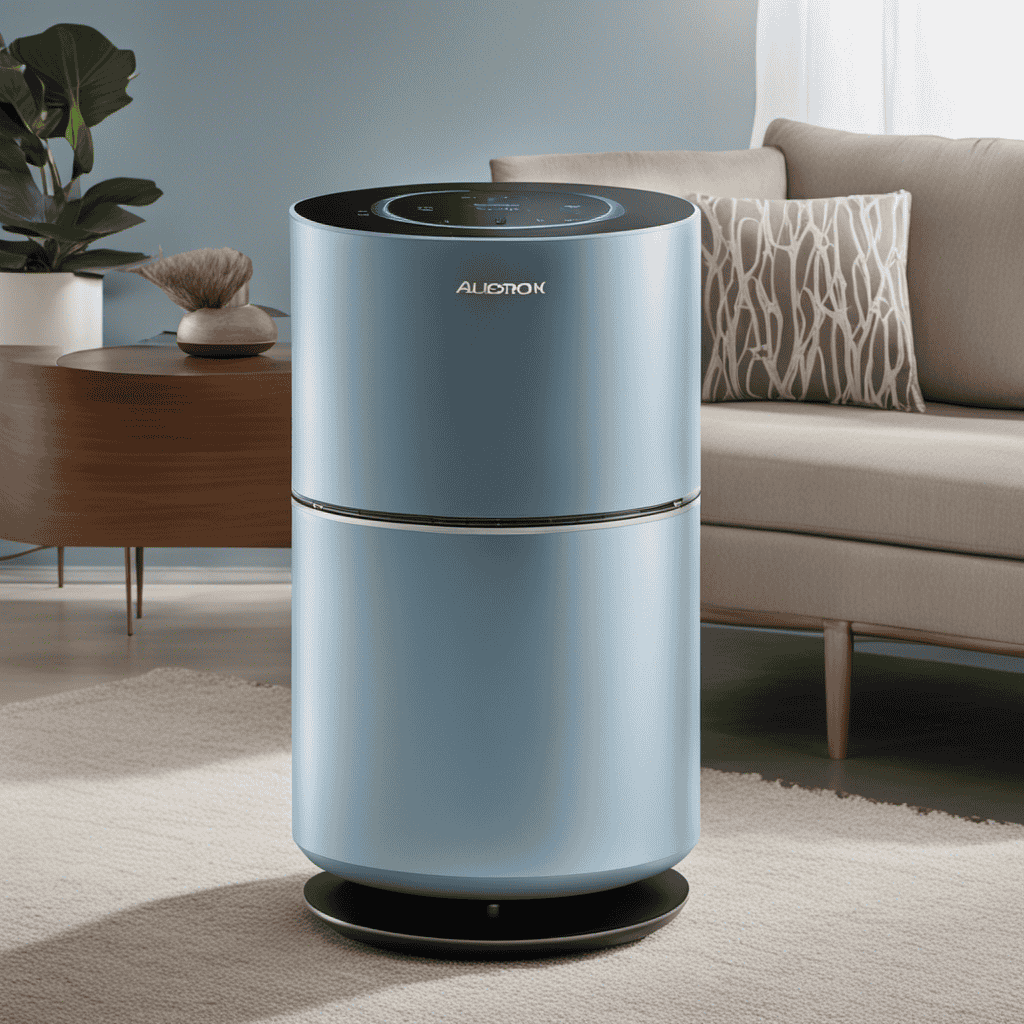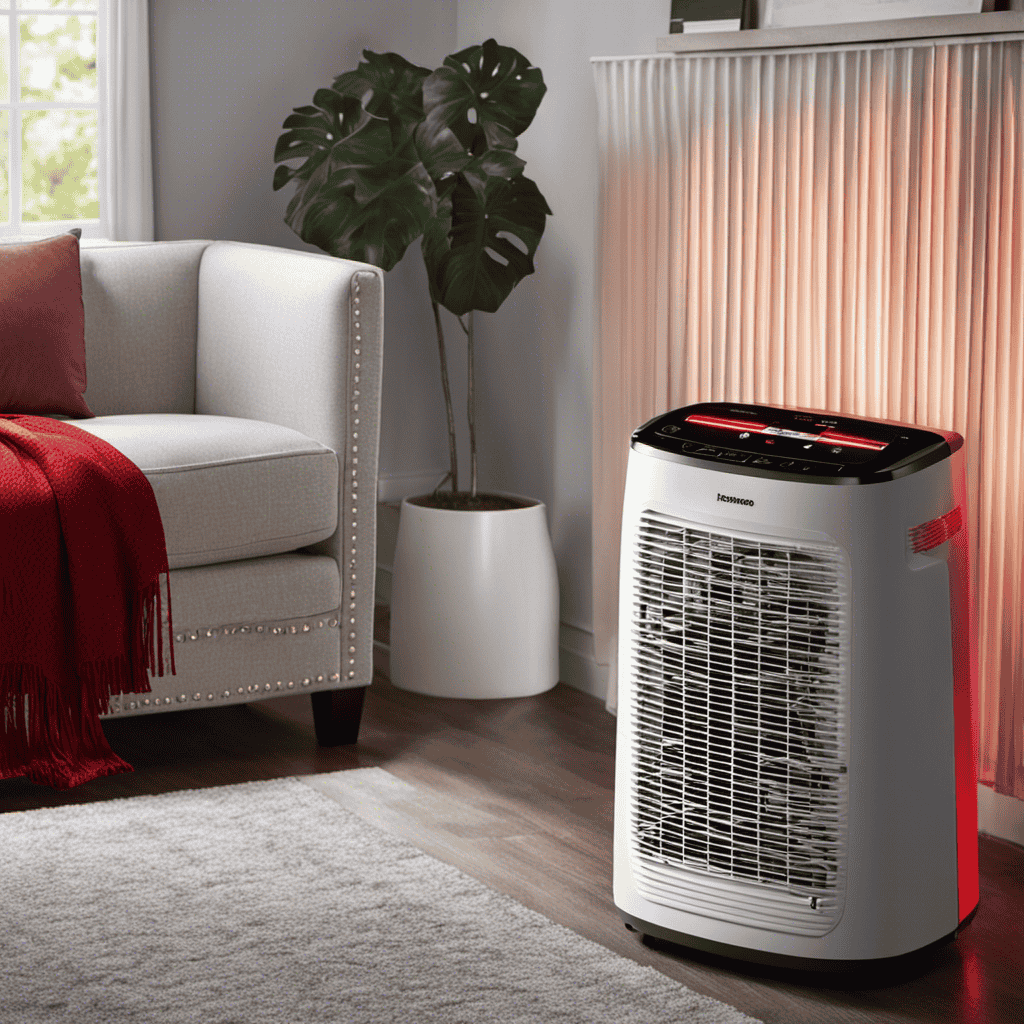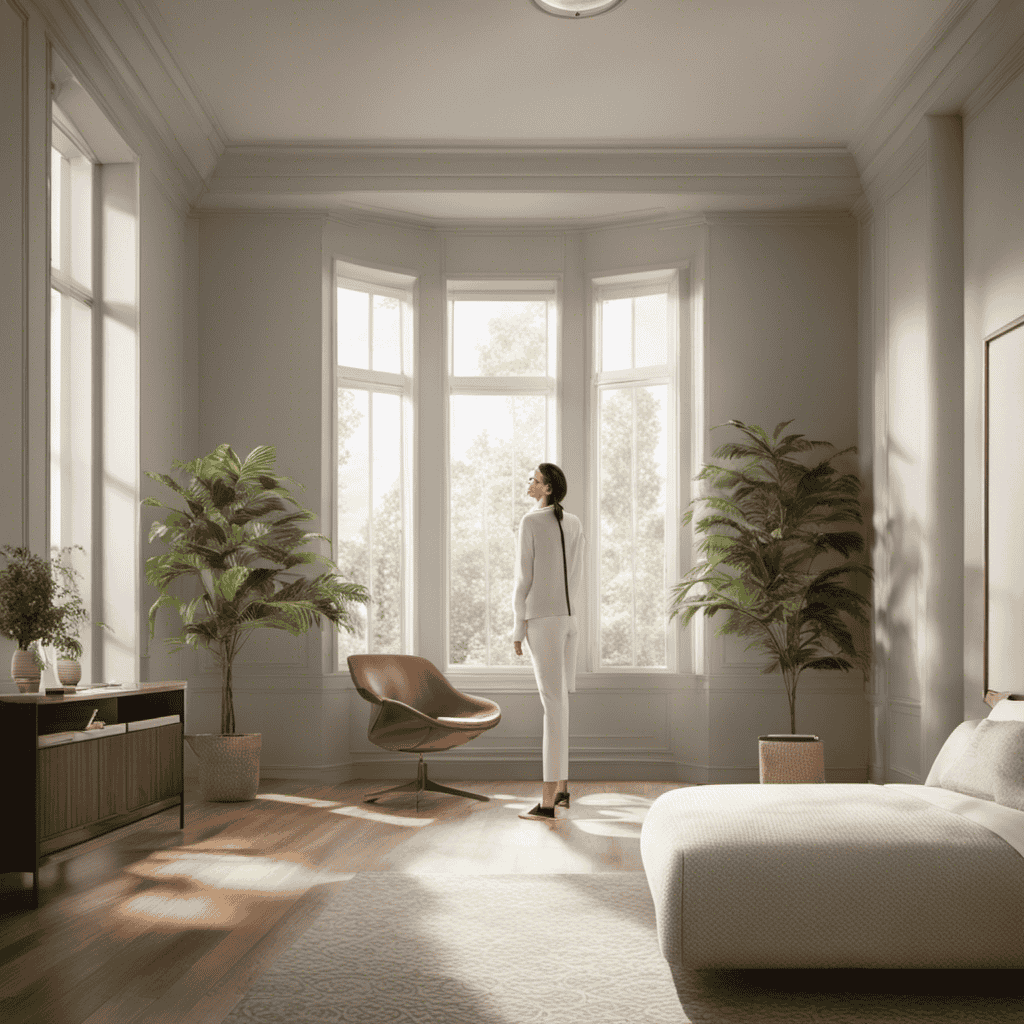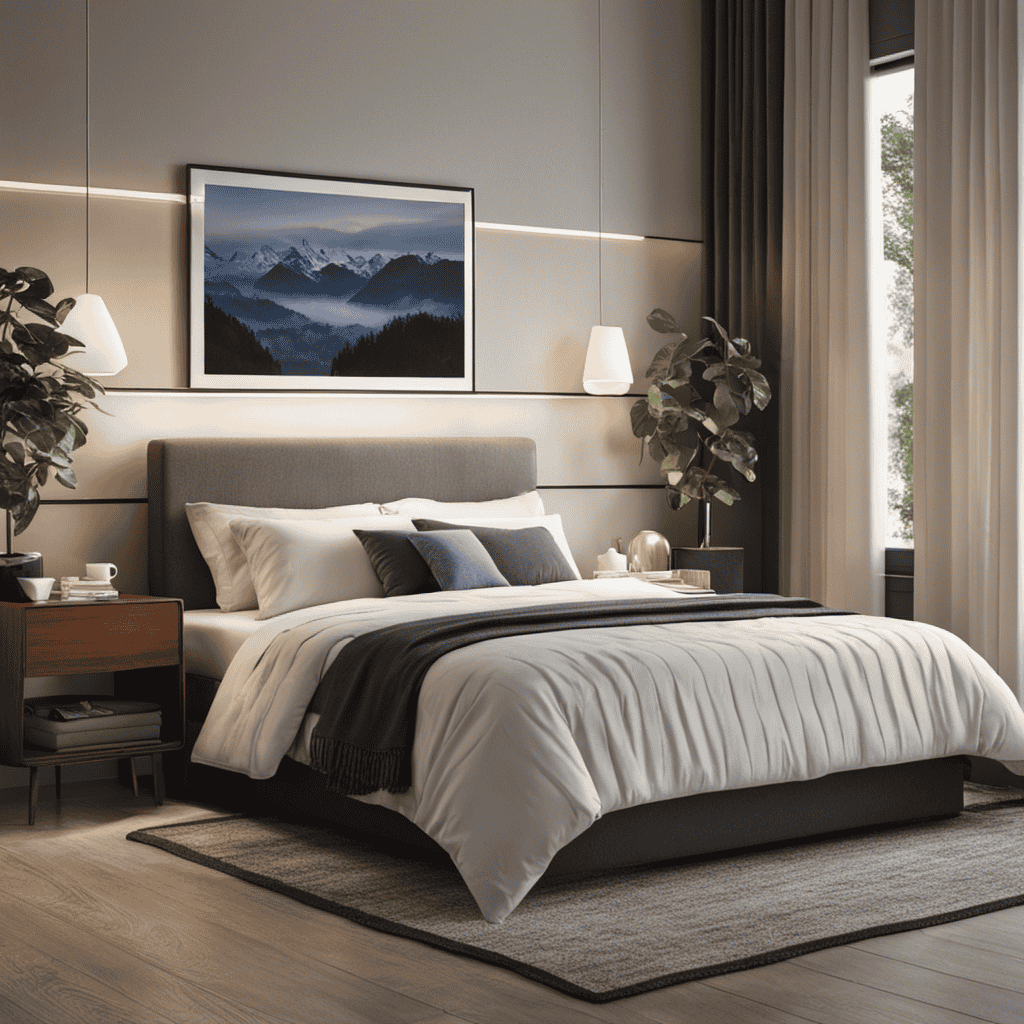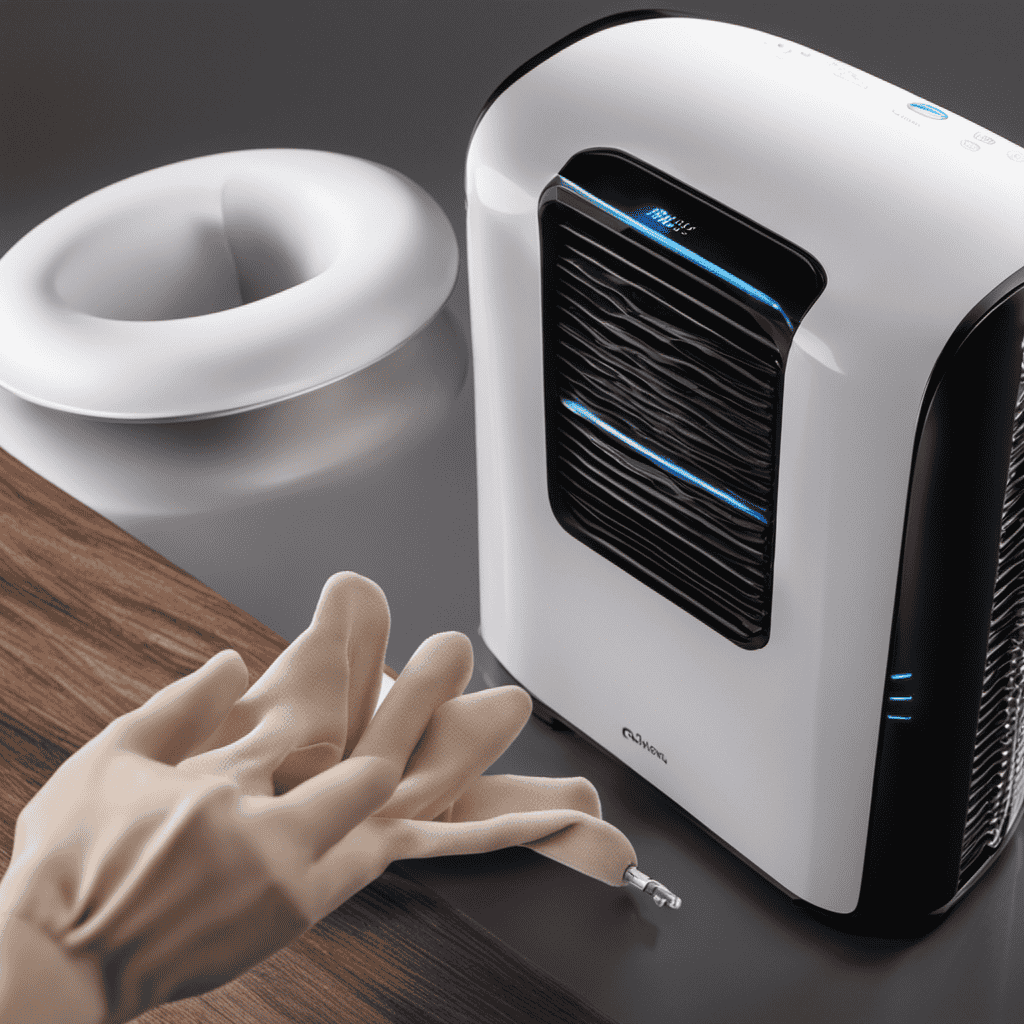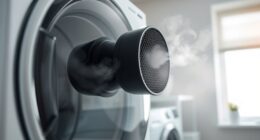In the quest to discover the top air purifier for allergy relief, we are faced with a decision: should it be an electronic model or one equipped with a HEPA filter?
In this article, I will delve into the benefits of both options, highlighting their advantages and key features to consider.
With an informative and evidence-based approach, I aim to help you make an informed decision on which air purifier is the right choice for your allergies.
Let’s explore the world of air purification and find the solution that suits your needs.
Key Takeaways
- Electronic air purifiers are highly effective in removing allergens from the air.
- HEPA filter air purifiers are more effective at capturing and trapping small particles that cause allergies.
- Electronic air purifiers require less maintenance and have lower long-term costs.
- HEPA filter air purifiers operate quietly and are safe for those with respiratory conditions.
Benefits of Electronic Air Purifiers for Allergies
Electronic air purifiers are highly effective in removing allergens from the air, making them a great option for allergy sufferers. These devices use advanced technology to capture and eliminate airborne particles that can trigger allergies, such as dust, pollen, pet dander, and mold spores.
The effectiveness of electronic air purifiers for allergies is backed by scientific studies and customer reviews. They work by using electric charges to attract and trap allergens, preventing them from circulating in the air.
Compared to HEPA filter air purifiers, electronic air purifiers are often more cost-effective in the long run. While HEPA filters need regular replacement, electronic air purifiers only require occasional cleaning or replacement of the electrostatic plates. This not only saves money but also reduces waste.
Advantages of HEPA Filter Air Purifiers for Allergies
For allergies, HEPA filter air purifiers are more effective at removing airborne particles and reducing your symptoms. HEPA stands for High Efficiency Particulate Air, and these filters are designed to capture and trap small particles like pollen, pet dander, dust mites, and mold spores.
Numerous studies have shown the effectiveness of HEPA filters in improving indoor air quality and relieving allergy symptoms. Not only are HEPA filter air purifiers highly efficient, but they are also a cost-effective solution in the long run. While the initial cost might be higher compared to electronic air purifiers, HEPA filters have a longer lifespan and require less maintenance. Additionally, HEPA filters do not produce any ozone, making them safe for those with respiratory conditions.
Now, let’s explore the key features to consider in electronic air purifiers.
Key Features to Consider in Electronic Air Purifiers
When considering an air purifier, you’ll want to prioritize the features that are most important to you.
One key feature to consider is smart technology, which allows the air purifier to connect to your smartphone or other devices for convenient control and monitoring. With smart technology, you can easily adjust settings, receive notifications about filter replacement, and even monitor the air quality in your home in real-time.
This feature is especially beneficial for those with allergies, as it allows you to stay informed about the air quality and make necessary adjustments to ensure a clean and healthy environment.
Air quality monitoring is another important feature to consider, as it provides accurate and timely information about the pollutants and allergens present in your home, helping you make informed decisions about when to use the purifier and when to take other measures to improve air quality.
Important Factors to Look for in HEPA Filter Air Purifiers
One of the most crucial factors to consider in HEPA filter air purifiers is the level of filtration it provides. HEPA filters are known for their high effectiveness in removing airborne particles, such as pollen, dust mites, pet dander, and mold spores. These filters are designed to capture particles as small as 0.3 microns with an efficiency rate of 99.97%. To further engage the audience, let’s take a look at a table comparing different HEPA filter air purifiers based on their effectiveness and noise levels:
| Air Purifier Model | HEPA Filter Effectiveness | Noise Level |
|---|---|---|
| Model A | 99.97% | 40 dB |
| Model B | 99.99% | 45 dB |
| Model C | 99.95% | 35 dB |
| Model D | 99.98% | 50 dB |
| Model E | 99.96% | 38 dB |
As we can see from the table, different models offer varying levels of HEPA filter effectiveness and noise levels. This information can help us make an informed decision when choosing the right air purifier for allergies. Now, let’s explore the comparison between electronic and HEPA filter air purifiers.
Choosing the Right Air Purifier for Allergies: Electronic or HEPA Filter?
The effectiveness and noise levels of different models can guide us in choosing between electronic and HEPA filter air purifiers. When comparing air purifiers, it’s important to consider the following factors:
-
Filter Efficiency: HEPA filters are known for their high efficiency in capturing particles as small as 0.3 microns, making them ideal for allergy sufferers.
-
Maintenance: Electronic air purifiers often require less maintenance compared to HEPA filter models, as they don’t need regular filter replacements.
-
Noise Levels: Some electronic air purifiers can be noisy due to the fan, while HEPA filter models generally operate quietly.
-
Cost: HEPA filter air purifiers may require filter replacements, leading to additional costs over time, whereas electronic air purifiers have lower long-term maintenance costs.
Considering these factors, it’s crucial to research and compare air purifier brands to find the best fit for your specific needs and allergies.
Frequently Asked Questions
Can an Air Purifier Completely Eliminate All Allergens From the Air?
An air purifier can help reduce allergens in the air, but it may not completely eliminate them. There are limitations to its effectiveness, and the choice between electronic and HEPA filter purifiers depends on personal preferences and needs.
How Often Do I Need to Replace the Filters in an Electronic Air Purifier?
I replace the filters in my electronic air purifier regularly to keep it clean and efficient. However, I’ve found that using a HEPA filter provides even better benefits for allergies, capturing more allergens in the air.
Can an Air Purifier Help With Allergies Caused by Pet Dander?
Using an air purifier can greatly help with allergies caused by pet dander. The effectiveness of an air purifier in removing allergens like pet dander can provide numerous benefits and improve indoor air quality.
Are There Any Potential Side Effects of Using an Electronic Air Purifier for Allergies?
Using an electronic air purifier for allergies may have potential risks. Comparing its effectiveness to a HEPA filter is important. However, without the context of specific models, it’s challenging to determine which is better.
Can an Air Purifier Help With Allergies Caused by Outdoor Pollutants Like Pollen?
Air purifiers can reduce symptoms of allergies and work for outdoor allergens like pollen. They filter and capture pollutants, providing cleaner air. It’s important to choose the right type, such as electronic or HEPA filter, based on individual needs.
Which type of air purifier is better for filtering out allergens, electronic or HEPA?
When it comes to filtering out allergens, both electronic and HEPA air purifiers are effective options. However, if you’re specifically looking for high-quality filters, consider checking out the range of amazon air purifier filters HEPA available. They offer advanced filtration technology, capturing even the tiniest particles, providing you with cleaner and healthier air to breathe.
Conclusion
After exploring the benefits of both electronic air purifiers and HEPA filter air purifiers for allergies, it is clear that each has its own advantages.
Electronic air purifiers are effective in removing larger particles from the air, while HEPA filter air purifiers excel at capturing smaller particles.
Ultimately, the choice between the two depends on the specific needs and preferences of the individual. Just like in life, sometimes we need to weigh our options and choose what works best for us.
Remember, the air purifier you select can make a significant difference in managing your allergies, so choose wisely.
